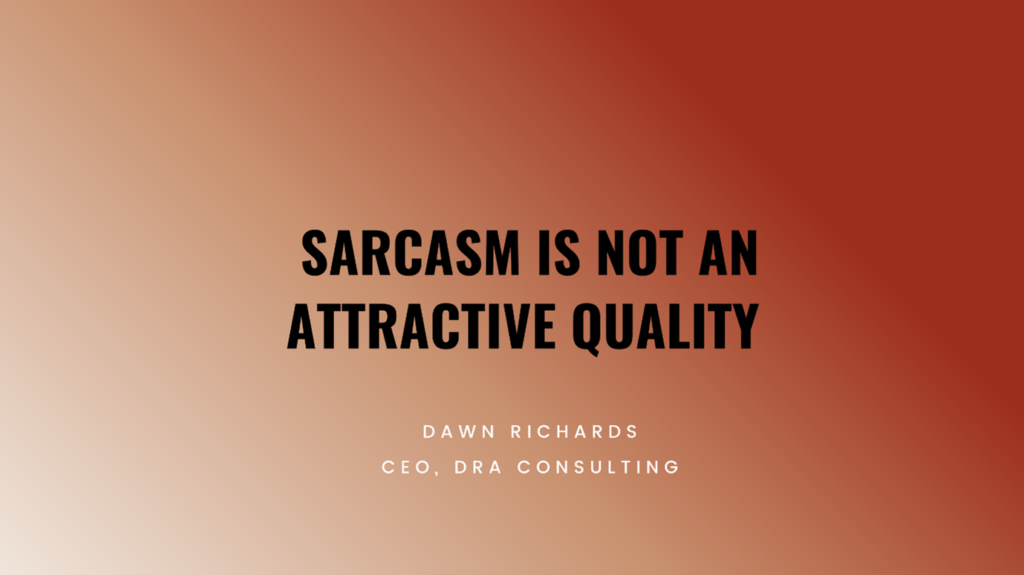When it comes to interactions with colleagues and customers, some individuals wear their ability to wield sarcastic remarks like a badge of honour. They believe that it gives them some sort of superior status that has eluded those individuals who suffer from its insufficiency and so they launch volleys at every opportunity, to spotlight their skill.
Let me say here, that sarcasm is an extremely unattractive quality. Especially when it is used as a whipping tool by individuals to “teach people a lesson.”
I once encountered a junior manager in a training program who described himself as “Mr. Sarcastic.” He did so with a sanctimonious grin. Well, at the end of my on-spot “coaching session,” he vowed to drop the title and become an advocate for respectful engagement.
Sarcasm is an extremely unattractive quality. Especially when it is used as a whipping tool by individuals to “teach people a lesson.”
Here’s what sarcasm does. It dispossesses the targeted individual of his or her dignity, especially when used in public to either correct or to admonish him or her. Instead of teaching people lessons, it may erode their sense of confidence, create deep feelings of embarrassment and instil a loathing for the individual inflicting the damage.
Sarcasm shows up in many forms. Verbally, through sentences that are intended to highlight the level of ignorance of the targeted individual and non-verbally, through denigrating gestures like eye-rolling and loud sighs that express levels of disdain. It shows up in email messages that cause internal disequilibrium on the part of the recipient.
Some wielders have told me that it’s a communication device that gets the job done when other, more formulaic methods fail to achieve the desired outcomes. Whilst doing the victory dance, some wielders are blind to the internal injuries that are invisible to the eye, but which undermine the well-being of those on the receiving end.
When sarcasm is normalized and sanctioned within a business culture, communication channels and teamworking practices weaken under the burden of slowly expanding negative energy.
So, why am I vilifying the practice in such an impassioned manner? Because I have come across wonderfully productive individuals who become overwhelmed by fear of disapproval and have their sense of self-worth suffocated by self-consciousness of their “ignorance.”
When sarcasm is normalized and sanctioned within a business culture, communication channels and teamworking practices weaken under the burden of slowly expanding negative energy. At the communication level, people brace themselves for the sarcasm that is sure to come within the thread of verbal or written messages. The skilled individuals learn how to navigate these dangerous waters. They say just enough to inform without provoking a volley of negative backlash. Of course, under these conditions, the freedom to share information in real time, or behave in an authentic way, is constrained by the need to stay out of harm’s way.
At the teamworking level, all sorts of adverse outcomes become the reality. Conflict brews between team members who should be collaborators, workflows are disrupted because of the time being wasted in mindless back and forth exchanges between individuals who are at war. Meanwhile, everyone who’s not locked into the exchange, is walking on eggshells around the main characters.
No one on the leadership team should be guilty of the sin of sarcasm!
At the customer experience level, a serious lack of intersection between urgency, communication, efficiency and speed of resolution occurs, simply because the level of responsiveness that should drive the standards of care in these areas, is hamstrung because of endemic conflict.
What should the leadership be doing to resolve and eliminate this state of affairs? Well, for starters, no one on the leadership team should be guilty of the sin of sarcasm. If there is a cue forthcoming from the top, it should be that any behaviour that alienates the existence of a psychologically safe space for individuals to express themselves, should be disallowed. Sarcasm in all of its forms of expression, should be on this list.
Far too often, I encounter team members who complain about other team members or line managers demonstrating sarcasm and when I ask what’s being done to address the stressful situations that would have arisen, the responses I receive are the shrugging of shoulders and resigned sighs.
Individuals should not be peddlers of a tool that weaponizes disharmony and psychological harm.
Sarcasm is not funny. Maybe to the wielder, he or she may want to communicate their level of wit, but what emerges is the image of someone who may lack consideration for the feelings of others, who may not know how to make a point using more effective tools of communication, or who may have an unresolved need to feel superior to others.
Irrespective of the motivation for the sustained use of sarcasm, individuals should not be peddlers of a tool that weaponizes disharmony and psychological harm.
Simply put, we just need to stop normalizing hostility.

